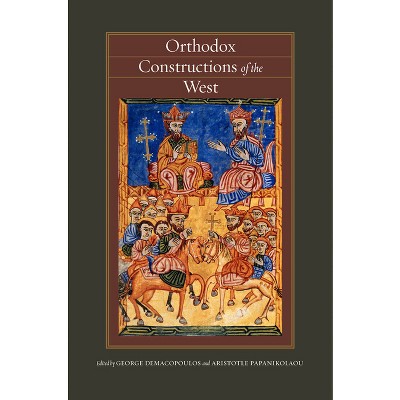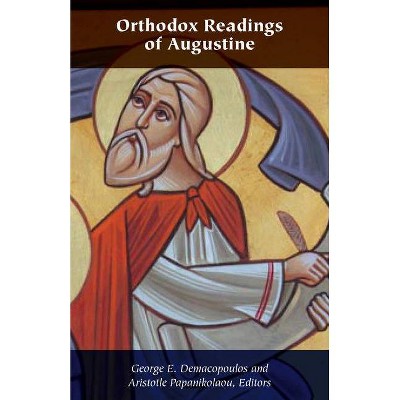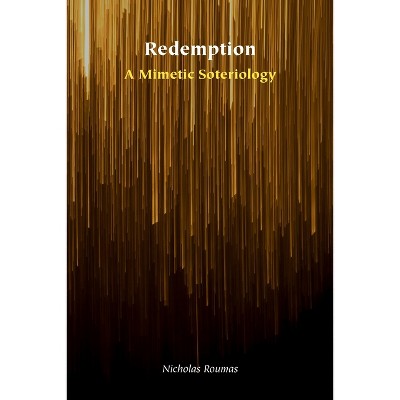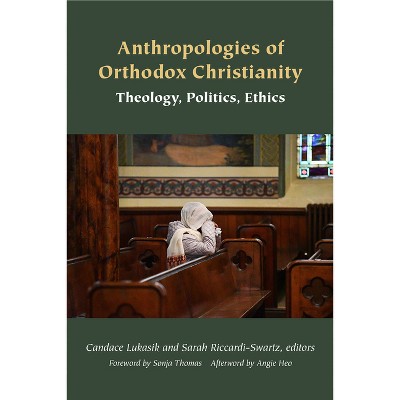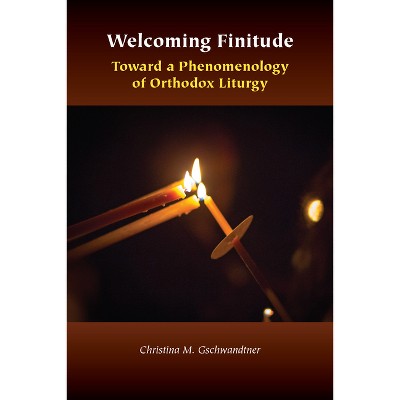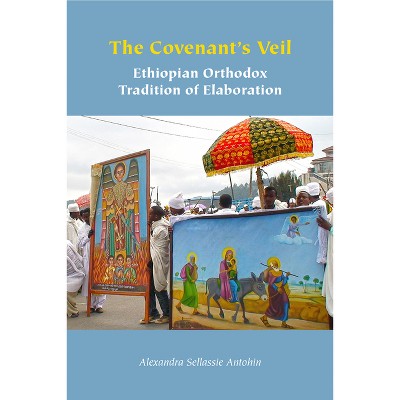Nicaea and the Future of Christianity - (Orthodox Christianity and Contemporary Thought) by George E Demacopoulos & Aristotle Papanikolaou

$80.00 when purchased online
Target Online store #3991
About this item
Highlights
- Commemorating the 1700th anniversary of the Council of Nicaea, this volume offers an original examination of the enduring impact of the single most famous gathering of Christians since the apostolic age Despite the longstanding historical and theological study of the Council of Nicaea, several central questions remain.
- About the Author: George E. Demacopoulos (Edited By) George E. Demacopoulos is Fr. John Meyendorff & Patterson Family Chair of Orthodox Christian Studies and Professor of Theology at Fordham University.
- 400 Pages
- Religion + Beliefs, Christian Theology
- Series Name: Orthodox Christianity and Contemporary Thought
Description
Book Synopsis
Commemorating the 1700th anniversary of the Council of Nicaea, this volume offers an original examination of the enduring impact of the single most famous gathering of Christians since the apostolic age
Despite the longstanding historical and theological study of the Council of Nicaea, several central questions remain. Was Nicaea a theological event or a political one? What does it mean if it was both? Was Constantine's intervention without precedent, or was he simply continuing a long-standing role of a Roman emperor who was responsible for leading a religious cult (albeit now for a different faith tradition)? And what about the actual theological debates of Nicaea and our ability to understand them? Scholars might never exhaust this avenue of inquiry, despite the numerous studies in recent decades. For many scholars and Christian activists today, the significance of Nicaea centers around the idea of conciliarity and what this has meant, both historically and theologically, for the Christian community. Why and how did Nicaea become foundational for thinking that the church operates in a conciliar manner? How did that work historically in different parts of the Christian world? And how should it work today? Nicaea and the Future of Christianity offers a fresh, globally-diverse, ecumenically-minded approach to these questions with an impressive collection of both senior and junior scholars, reflecting a diversity of views within the Orthodox, Catholic, and Protestant traditions. The great benefit of this wide-ranging approach lies precisely in its ability to see the many ways in which Nicaea continues to speak to the future of Christianity.Review Quotes
The editors of this excellent collection have drawn from the very best of historical scholarship and contemporary theology to provide a wide range of perspectives on the Council of Nicaea. Attentive to ecumenical questions, as well as to the phenomenon of "conciliarity" itself, the volume looks to the future as well as the past. It will become a landmark treatment of the most significant event in early Christian history.---David G. Hunter, Margaret O'Brien Flatley Chair of Catholic Theology at Boston College
This volume is a must read. The Council of Nicaea in AD 325 is fundamental for the history of Christianity and the church, yet almost everything around it is controversial, including the so-called Nicene Creed, the proceedings of the Council and the part played by the Emperor Constantine. In the 1700th year after 325 a variety of leading scholars offer important new assessments of Nicaea's significance today and for the future.---Dame Averil Cameron, author of Transitions: A Historian's Memoir
In this timely volume, the editors have assembled a stellar cast of scholars from a range of perspectives and ecclesial commitments. Adopting historical, systematic, and cultural approaches to the first ecumenical council of 325, the authors explore not only the theology of Nicaea, but its ongoing reception and its meaning for the church in our world. The learned chapters challenge standard assumptions about the history and legacy of the council in hopes of providing a new vision of God's action in the decrees, disputes, and dialogue that inform so much of Christian thought.---Brian Dunkle, Boston College Clough School of Theology and Ministry
An illuminating work that from a number of different perspectives stimulates readers of all levels to follow up exciting new lines of thought, Nicaea and the Future of Christianity is a landmark publication. It will no longer be possible to view councils simply as institutions for closing debates and producing definitions. The way in which councils from Nicaea onwards need constantly to be re-received is here brilliantly expounded by a star cast of authors.---Norman Russell, Honorary Research Fellow, St Stephen's House, University of Oxford
If you wish to understand the contemporary significance of Nicaea, this is one of the top three books you need to read. You will find a wealth of insight on such issues as the development of doctrine, the authority of the creeds, and the importance of the synodal process for decision-making. Highly recommended!---Paul Gavrilyuk, Founding President of the International Orthodox Theological Association (IOTA)
The Council of Nicaea is a grain of mustard seed from Jesus's parable. It started as a modest gathering to address a local theological issue that emerged in northeastern Africa and it grew to one of the most comprehensive frames for global Christianity. The volume explores this plant from its roots up to the crown, as well as the phases of its growth.---Archimandrite Cyril Hovorun, director of the Huffington Ecumenical Institute at Loyola Marymount University in Los Angeles
About the Author
George E. Demacopoulos (Edited By)George E. Demacopoulos is Fr. John Meyendorff & Patterson Family Chair of Orthodox Christian Studies and Professor of Theology at Fordham University. He is also a Co-founding Director of the Orthodox Christian Studies Center at Fordham University. He serves as a Senior Fellow at Dumbarton Oaks and as President of the Byzantine Studies Association of North America. He is the author of five monographs and dozens of scholarly articles of the history of Christianity in the premodern period. Aristotle Papanikolaou (Edited By)
Aristotle Papanikolaou is professor of theology, the Archbishop Demetrios Chair of Orthodox Theology and Culture, and a Co-Director of the Orthodox Christian Studies Center at Fordham University. He is also McDonald Distinguished Senior Fellow at the Emory University Center for the Study of Law and Religion. He is the author of two monographs and numerous scholarly articles on Orthodox theology, as well as co-editor of ten volumes.
Dimensions (Overall): 10.1 Inches (H) x 7.0 Inches (W) x 1.0 Inches (D)
Weight: 1.7 Pounds
Suggested Age: 22 Years and Up
Number of Pages: 400
Genre: Religion + Beliefs
Sub-Genre: Christian Theology
Series Title: Orthodox Christianity and Contemporary Thought
Publisher: Fordham University Press
Theme: Ecclesiology
Format: Hardcover
Author: George E Demacopoulos & Aristotle Papanikolaou
Language: English
Street Date: July 1, 2025
TCIN: 93353409
UPC: 9781531510169
Item Number (DPCI): 247-48-4112
Origin: Made in the USA or Imported
If the item details above aren’t accurate or complete, we want to know about it.
Shipping details
Estimated ship dimensions: 1 inches length x 7 inches width x 10.1 inches height
Estimated ship weight: 1.7 pounds
We regret that this item cannot be shipped to PO Boxes.
This item cannot be shipped to the following locations: American Samoa (see also separate entry under AS), Guam (see also separate entry under GU), Northern Mariana Islands, Puerto Rico (see also separate entry under PR), United States Minor Outlying Islands, Virgin Islands, U.S., APO/FPO
Return details
This item can be returned to any Target store or Target.com.
This item must be returned within 90 days of the date it was purchased in store, shipped, delivered by a Shipt shopper, or made ready for pickup.
See the return policy for complete information.






